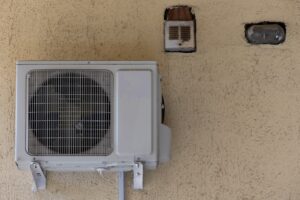A heat pump is an efficient solution for both heating and cooling your home. Unlike traditional HVAC systems, a heat pump transfers heat rather than generating it, making it an energy-efficient option. Whether you are considering a mini split system or a traditional split system, understanding how a heat pump works can help you make an informed decision.
How Heat Pumps Work and Their Key Components
Heat pumps work by transferring heat from one place to another. During the winter, they extract heat from the outside air and bring it inside to warm your home. During the summer, they reverse the process, removing heat from inside your home and releasing it outside, thus cooling your space. This transfer of heat is what makes heat pumps an energy-efficient choice.
The key components of a heat pump include:
1. Compressor: The compressor pumps refrigerant through the system. It changes the refrigerant from a low-pressure gas to a high-pressure gas, which is crucial for the heat transfer process.
2. Condenser Coils: These coils release or absorb heat depending on the mode the heat pump is operating in, heating or cooling.
3. Expansion Valve: This component reduces the pressure of the refrigerant, allowing it to cool down before entering the evaporator coils.
4. Evaporator Coils: These coils absorb heat during the cooling process and release heat during the heating process.
5. Reversing Valve: This valve switches the direction of the refrigerant flow, allowing the heat pump to change from heating to cooling mode and vice versa.
Understanding these components helps in appreciating how a heat pump achieves its dual functionality. It doesn’t create heat; it moves it, making heat pumps a smart choice for energy efficiency.
Comparing Heat Pumps to Traditional HVAC Systems
Heat pumps and traditional HVAC systems serve the primary function of regulating indoor temperatures but do so in different ways. Understanding these differences helps in deciding which system suits your needs better.
- Energy Efficiency: Heat pumps are generally more energy-efficient than traditional HVAC systems. While traditional HVAC systems generate heat by burning fuel or using electrical resistance, heat pumps transfer existing heat. This method often results in lower energy consumption and costs.
- Dual Functionality: Another significant difference is that heat pumps offer both heating and cooling in one unit. Traditional systems typically require separate units—a furnace for heating and an air conditioner for cooling. This dual functionality of heat pumps can simplify your HVAC installation and reduce the need for multiple units and maintenance.
- Maintenance Requirements: Heat pumps require regular maintenance like traditional HVAC systems. However, since heat pumps have fewer components, the maintenance can be less frequent and less complex. Routine checks on the HVAC filter, refrigerant levels, and overall system performance are needed for both types of systems.
- Performance in Extreme Temperatures: Traditional HVAC systems usually perform better in extreme temperatures. Heat pumps may struggle to extract enough heat from the outside air in very cold conditions, requiring a backup heating system.
By comparing these aspects, it becomes clear why many are turning to heat pumps for their heating and cooling needs. The energy efficiency and dual functionality stand out as significant advantages, especially for moderate climates.
Major Benefits of Installing a Heat Pump in Your Home
Installing a heat pump in your home offers several significant benefits that enhance comfort and efficiency. Here are some of the most notable advantages:
- Energy Efficiency: Heat pumps are known for their high energy efficiency. Unlike traditional HVAC systems that generate heat, heat pumps transfer heat, which requires less energy. This can lead to lower utility bills and a reduced carbon footprint.
- Year-Round Comfort: One of the standout features of a heat pump is its ability to provide both heating and cooling. With a single unit, you can keep your home comfortable in all seasons. This dual functionality eliminates the need for separate heating and cooling systems, simplifying HVAC installation and maintenance.
- Improved Air Quality: Heat pumps often come with advanced filtration systems that help improve indoor air quality. By regularly maintaining your HVAC filter, you can reduce dust, allergens, and other pollutants, making your home healthier.
- Quiet Operation: Heat pumps generally operate more quietly than traditional HVAC systems. This is particularly beneficial for indoor comfort, as there is less noise disturbance.
- Lower Maintenance Costs: Since heat pumps have fewer mechanical components than conventional HVAC systems, they typically require less maintenance and experience fewer repairs. Regular HVAC service can keep your system running smoothly, reducing overall maintenance costs.
These benefits make heat pumps an attractive option for homeowners looking to enhance their home’s comfort and efficiency.
Choosing the Right HVAC Professionals for Your Heat Pump Needs
Selecting the right professionals for your heat pump needs is crucial for ensuring optimal performance and efficiency. Here are some key factors to consider:
- Experience and Expertise: Look for HVAC companies with a proven track record in heat pump installation, maintenance, and repair. Experienced professionals are more likely to diagnose problems accurately and offer effective solutions.
- Comprehensive Services: Choose an HVAC service provider that offers a range of services, including installation, routine maintenance, and emergency repairs. This ensures you have access to all necessary services from a single provider.
- Certifications and Training: Ensure the technicians are certified and have undergone professional training. Certified professionals are knowledgeable about the latest technologies and best practices in the HVAC industry.
- Customer Reviews and Testimonials: Check customer reviews and testimonials to gauge the quality of service provided by the HVAC company. Positive feedback from previous clients can indicate reliable and high-quality service.
- Transparent Pricing: Opt for a company that offers transparent pricing and detailed quotes. This helps you understand the costs involved and ensures there are no hidden charges.
- After-Sales Support: Good HVAC companies offer robust after-sales support, including warranties and follow-up services. This ensures your heat pump remains in good working condition long after the installation.
Conclusion
Understanding the benefits of a heat pump for your home is essential for making an informed decision about your heating and cooling needs. Heat pumps offer energy efficiency, year-round comfort, improved air quality, quiet operation, and lower maintenance costs. These advantages make them a smart investment for any homeowner looking to enhance indoor comfort and reduce energy consumption.
If you’re considering installing a Daikin heat pump in Rice Lake or need maintenance on your existing system, contact Dirk’s Heating and Cooling Inc. today for expert service and peace of mind!






